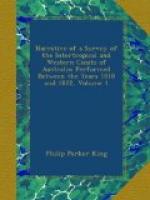September 25.
At daylight the following morning, being by the reckoning only thirty-four miles to the eastward of the north end of the island, we bore up for it; but the land, being enveloped in clouds, was not seen until noon; we then found ourselves off the south-east end, instead of the north point; having been set to the southward since yesterday noon at the rate of three quarters of a mile an hour: in consequence of which we determined upon going round the south side, and bore up for that purpose; upon approaching the land we found another current setting us to the north.
September 26.
The next morning at nine o’clock we passed round the Morne Brabant, the south-west point of the island, but it was four o’clock before we reached our anchorage (at a cable’s length within the flag beacon at the entrance of Port Louis) in fifteen fathoms mud; we were then visited by the Health Officer, and afterwards by a boat from H.M. Ship Menai, which was at anchor in the port.
September 27.
But as it was too late that evening to enter the brig was not moved until the following morning, when she was warped in and moored head and stern within the harbour.
My wants were immediately made known to Captain Moresby, C.B. (of H.M. Ship Menai) who directed the necessary repairs to be performed by the carpenters of his ship; those articles which could not be supplied from the Menai’s stores were advertised for in the Mauritius Gazette, when the most reasonable tenders were accepted.
As many of the carpenters and caulkers of the Menai as could be spared from their other occupations were daily employed upon our repairs; but from her being put into quarantine and other unforeseen delays they were not completed for nearly a month: our sails were repaired by the Menai’s sailmakers; and, as all our running rigging was condemned and we had very little spare rope on board, her rope-makers made sufficient for our wants. The greater part of our bread, being found in a damaged state from leaks, was surveyed and condemned.
Captain Flinders’ account of Mauritius appears to have been drawn up with much correctness and judgment, and is, even at the present day, so descriptive of the island as to be considered, both by the English and French residents of Port Louis, as the best that has yet been given to the world. Many alterations and considerable improvements have however taken place since his departure, and among the latter the improved system of the culture of the sugar cane, and the introduction of modern machinery into their mills, may be particularly mentioned. These have been effected entirely by the political changes that have, since Captain Flinders’ captivity, taken place in the government of the island; and by the example and exertions of the English, who possess very large plantations, and indeed may be considered now as the principal proprietors of the land.




